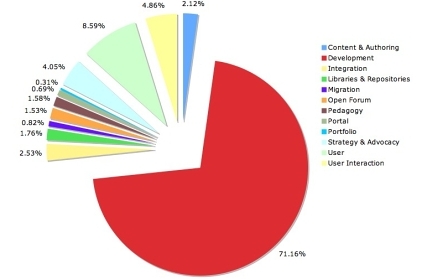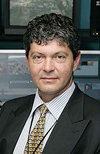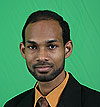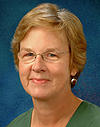Chapter 2. Author Profiles
Already a veteran Silicon Valley high tech entrepreneur, Rob Abel entered the world of educational technology in 1999 by joining Collegis (now SunGard Higher Education), the leading provider of information, academic, and online technology services in the U.S. higher education market. Prior to joining Collegis, he was responsible for development of products and services for online learning at Oracle. In 2004 Rob founded the Alliance for Higher Education Competitiveness (A-HEC) to conduct research on best practices in the use of technology in education. One study conducted near the end of 2005 looked specifically at the level and types of adoption of open source in the U.S. higher education market, sponsored by Sun, SCT, and Unicon. The report on this unique study is available online at the A-HEC Open Source Software Research site.
In February 2006 Rob was appointed as the CEO of the IMS Global Learning Consortium (IMS GLC), a non-profit member consortium that have been focused on developing specifications and standards for interoperability exclusively in the learning sector for now over eleven years. Participation in IMS GLC includes an annual report on Learning Impact: Trends in Learning, Technology, and Standards. This report was inspired by the need to “connect the dots” between new and innovative learning technologies and the key global challenges of education leaders across sectors. IMS GLC has featured tracks on open technologies in its annual conference each of the last two years.
Gavin Baker is an IT and public policy consultant. Currently he is developing a student outreach campaign for SPARC, the Scholarly Publishing and Academic Resources Coalition, on the subject of open access to academic journal literature. Gavin also serves on the board of directors for FreeCulture.org, which is an international student organization that promotes the public interest in intellectual property and information & communications technology policy.
Leigh Blackall specializes in networked learning and socially networked media and communications. He is employed as an Educational Developer at the Otago Polytechnic in Dunedin, New Zealand, and blogs his work to Learn Online.
Cole W. Camplese serves as the Director of Education Technology Services at the Pennsylvania State University. As Director, it is his responsibility to oversee University-wide initiatives with a focus on impacting teaching and learning with technology. He guides teams in the appropriate uses of technologies in the contexts of teaching and learning. His primary area of focus is the integration of emerging technologies into learning spaces. At Penn State, the overwhelming challenge is providing scalable solutions that the nearly 90,000 students and 5,000 faculty can successfully use to enhance their teaching and learning environments.
Camplese has recently worked to integrate several new emerging technologies into curricular activities at Penn State to support digital expression. He and his team have lead the creation of the Blogs at Penn State, Podcasts at Penn State, and the Digital Commons. Camplese oversees the annual Symposium for Teaching and Learning with Technology, several community development events, and numerous other initiatives designed to support the adoption of technology for teaching and learning.
James Dalziel is Professor of Learning Technology and Director of the Macquarie E-Learning Centre Of Excellence (MELCOE) at Macquarie University in Sydney, Australia. Prior to his current roles, James helped lead the COLIS (Collaborative Online Learning and Information Services) project, was a Director of WebMCQ Pty Ltd, an e-learning and assessment company, and was a Lecturer in Psychology at the University of Sydney. James currently leads a number of projects including:
LAMS
MAMS (Meta Access Management System) - a national identity and access infrastructure project for the Australian higher education sector
RAMP(Research Activityflow and Middleware Priorities) - a project investigating open standards authorization and e-Research workflows
ASK-OSS (the Australian Service for Knowledge of Open Source Software) - a national advisory service on open source issues for the Australia higher education and research sector
Jean-Claude Dauphin works at UNESCO HQ, Paris, in the Information Society Division. He has a software developer background and contributes to the development and dissemination of UNESCO information processing tools such as the Open Source Greenstone Digital Library system. He is also in charge of the UNESCO Free and Open Source portal and a member of the team in charge of UNESCO “ICT in Education, Sciences and Culture” activities. He is involved in activities related to Openness, and has a strong interest in FOSS Education solutions and open educational resources.
Michael Feldstein is the author of the e-Literate weblog. He is a lifelong educator who has been involved in online learning for eleven years. Michael has been a member of eLearn Magazine’s Editorial Advisory Board and is a current participant in the IMS. He is a frequent invited speaker on a range of e-learning-related topics. Most recently, he has been invited to speak on topics including e-learning usability, LMS evaluation methods, ePortfolios, and edupatents for organizations ranging from the eLearning Guild to the Postsecondary Electronic Standards Council, and has been interviewed as an e-learning expert by a variety of media outlets, including The Chronicle of Higher Education, the Associated Press, and U.S. News and World Report.
Steve currently serves as the Director of E-Learning at Marymount University in Arlington, Virginia, where he oversees distance learning, instructional technology, and technical training. He is also on the Advisory Board of WikiEducator, a Commonwealth of Learning funded project to develop a complete set of open educational resources for all disciplines at the primary, secondary, and tertiary level by 2015. He migrated to the open education movement from having been an open source software enthusiast, and prefers dedicating content to the public domain rather than licensing it.
Dr. Christine Geith is an assistant provost and executive director of Michigan State University’s MSUglobal, the university’s entrepreneurial business unit that works with academic partners across the campus and worldwide to develop online institutes, programs and services. She is responsible for developing strategic frameworks and business models and leading all activities that impact revenue growth.
Amee Godwin serves as Program Director, OER Commons, Institute for the Study of Knowledge Management in Education (ISKME). Amee Godwin has over a decade of experience in applied research and development of community applications. Her work focuses on connecting technology, education, and collaboration. At ISKME, she guides the development of content, interactivity, and partnerships for OER Commons, a teaching and learning network for open educational resources.
Mara Hancock serves as Associate Director for Educational Technology Services at UC Berkeley, and oversees the Learning Systems Group(LSG). She manages an extremely talented team of educational technologists, software programmers and architects, User Experience Designers, and training and support folks. We work with UC Berkeley faculty, students, and staff, as well as other educational technology professionals around the world to develop, adopt, and support collaboration and learning systems to enhance the teaching and learning experience.
Professor Derek W. Keats is Executive Director (similar to CIO in the US ) of Information & Communication Services (ICS) at the University of the Western Cape (UWC), where he is discovering Enterprise 2.0. ICS has a mandate to use information and communications technologies to strengthen UWC as a national institution of higher education in a global context.
Derek is a marine biologist with strong interests in using technology to improve teaching-and-learning, to enable higher education to create Education 3.0, and to promote sustainable development.
Professor Andy Lane has a BSc in Plant Sciences and a PhD in Pest Management from the University of London. He has been at The Open University since 1983 and held various offices in the former Technology Faculty (now Faculty of Maths, Computing and Technology) including being Head of the Systems Department and Dean of the Technology Faculty.
Promoted to Professor of Environmental Systems in 2005, he was appointed as Director of The Open University’s OpenLearn Initiative in 2006. He has authored or co-authored many teaching texts and research papers dealing with systems thinking and environmental management, the use of diagramming to aid systems thinking and study, and more recently the development and use of Open Educational Resources.
Wayne Mackintosh contributed to the series in mid-April and talked about WikiEducator, the freedom culture, and education.
In addition to Wayne’s work on WikiEducator, he was the founding project leader of New Zealand’s eLearning XHTML editor (eXe) project. Wayne is a committed advocate and user of free software for education. He currently serves the Commonwealth of Learning (COL) as Education Specialist, eLearning and ICT Policy and is the founding director of the Centre for Flexible and Distance Learning (CFDL) at the University of Auckland, New Zealand. Wayne has extensive experience in the theory and practice of open and distance learning (ODL). Prior to moving to New Zealand he spent eleven years working at the University of South Africa (UNISA), a distance learning institution and one of the world’s mega-universities.
Dr. Farideh Mashayekh serves as a Strategic Consultant in Educational Planning and Pedagogy with Pedagogy.ir. Much of her teaching, research, and other work have focused on systems approaches to planning adult education and lifelong learning and the application of cognitive and constructivist schools of thought in teaching-learning processes. In addition to being a prime mover behind Pedagogy.ir, she is a thought leader in the adult education community in Iran.
Pat Masson’s contribution to the OSS series was from personal experience about the barriers to institutional adoption of open source software. Pat currently serves as the Chief Information Officer for New York College of Technology at Delhi. As CIO, Pat provides oversight, leadership and vision for the college’s Campus Information Services including enterprise applications, technical centers and labs, server/systems administration, network & telecommunications, online/distance learning as well as user support such as help desk services.
Dick Moore serves as Director of Technology at Ufi, where he looks after four teams that design, build and maintain learndirect’s IT infrastructure. The concept of a ‘University for Industry’ led to the creation of Ufi, which in turn serves as an umbrella organization supporting learndirect. Learndirect is the world’s largest publicly funded e-learning platform with in excess of 2,5 million learners.
Craig Perue was appointed as the first staff member in the Instruction Support Systems unit in the IT department of the largest University of the West Indies campus in 2003. Craig was responsible for stimulating faculty adoption of WebCT which was being implemented across the University that year. The programme was so successful that the campus outstripped its budget for WebCT licenses which then allowed Craig to lead the evaluation of open source alternatives and one of the largest early implementations of moodle (15,000 students) in January 2004. As the manager of the campus’s educational technology practice, he led the campus’s re-branding and development of moodle as OurVLE and the campus’s migration away from WebCT, as well as the successful evangelization of moodle throughout the University and the English-speaking Caribbean.
The first guest contributor in our OSS Series, Ruth Sabean serves as the assistant vice provost for educational technology in UCLA’s College of Letters and Science and director of educational technology in the university’s Office of Information Technology.
Sabean is responsible for developing strategic educational technology plans and initiatives for UCLA that will improve the student educational experience through technology. From 1993–2002, she was the assistant director for educational technology in UCLA’s Office of Instructional Development, following positions directing and managing academic computing services at Cornell University and UCLA, and an early career in software development. She is an active member of EDUCAUSE, Seminars on Academic Computing (SAC), and the New Media Consortium (NMC). She has served on the boards of SAC, the NMC, and the EDUCAUSE Advisory Committee on Teaching & Learning. Sabean holds an M.S. degree in computer science from the University of Pittsburgh.
Gary Schwartz, Director of Communications & Middleware Technologies at Rensselaer Polytechnic Institute, has over 25 years experience in Higher Ed IT, first as a programmer, and subsequently in management. His present responsibilities include centralized email, directory, and web services an























